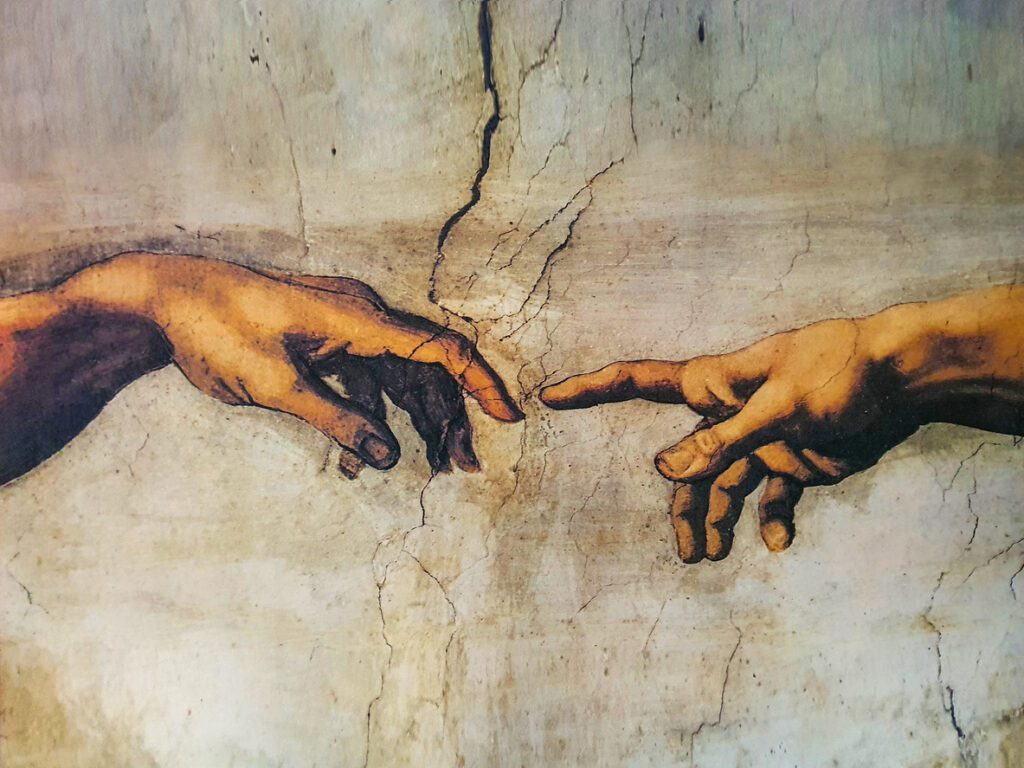Faith in the Somehow
02/01/2023From feng-shui to phyiscs, all realms of knowledge reach a threshhold where the best explanation begins with “somehow.” How much more our faith.
If you follow Jesus, if you belong to Him, what you are saying is that you have put your trust in a constellation of mysteries. Note the word “constellation,” not “set” or “system.” These words have their place — we all need an organized set of definitions, what some call a creed — but they do not have the ultimate place. That ultimate place is beyond our control and is a mystery. More accurately put: it is a group of mysteries. And yet these mysteries are more than a hodge-podge cluster. There is an arrangement to them, an intentionality, even if we cannot fully decipher it. This is why “constellation” is a good way to describe them.
What is a mystery? For the believer, it is where we cross the threshold of the ability to articulate what we know to be true. It is that point in the explanation where we say “somehow” and beyond that are the mysteries. Here is an example from Apostle Paul, writing to the Philippians (3:10-11):
“That I may know Him and the power of His resurrection and participation in His sufferings, being conformed to His death; if somehow I may attain to the resurrection from the dead.”
In reading this, we may ask: “Saint Paul, you who know the mysteries of the kingdom of God much better than we do: Exactly how do we attain to the resurrection of the dead?”
His answer: “Somehow. It’s a mystery that neither I nor brother John nor anyone else can precisely translate. (I John 3:2-3) We just know that, in the meantime and by any means, we long to know Him and trust Him in every experience of our lives, both the glorious ones and the painful ones. That’s our part in the mystery.”

And there are many other mysteries like that: The mystery that blood shed two millennia ago makes a person perfectly clean today. The mystery that bread and wine are the real presence of Christ. The mystery that the cross converts alienated ethnic groups into one genuine family. The mystery that a man and a woman, when married, are no longer two individuals only but one new creation. The mystery that evil, for all its ghastly willfulness, works for good as we trust Him. The mystery that the Word became flesh and dwelt among us, died among us, rose among us. And so on.
I am not describing a strictly religious phenomenon. I am describing the condition of all things we may know or think we know. Any human endeavor, any exploration of knowledge, reaches a threshold of “somehow.” Ask a physicist about string theory, and when she reaches the speculative edges of the theory she may sound as if she is describing Aslan singing creation into existence in C.S. Lewis’ The Magician’s Nephew. Ask a devotee of evolution to explain the Cambrian Explosion, that primeval era when virtually all major animal groups began appearing in the fossil record: “somehow.”
The key distinction is not in this universal condition of “somehow,” but in the assumption of what lies beyond the threshold. Some assert that what lies beyond it is finite, is knowable, and is destined to come under the control of mankind. For there is within us a craving to flatten out the mystery of all things, spiritual and otherwise, a mania to convert our noble desire to explore into an insatiable demand to conquer all uncertainties and thus trust no one but ourselves. Thus the wonder of exploration falls to the tyrant of self-crowned autonomy, where we are no longer children but fatherless kings.

But for the one who belongs to Christ, a mystery is an ever-unfolding secret you increasingly grasp and yet never control, a thing you go ever deeper into but never get to the bottom of. A thing that leaves you ever more grateful but never puffed up as if you were better than another. For the believer, a mystery is not like the intriguing enigma of Stonehenge or a riveting Agatha Christie novel. Such mysteries have a climactic moment of decoding and a conclusive end, and such things do have there place, for we were created to explore, discover, and steward well what we rule — and to not spoil the ending of good books for others!
But we are not decoders of God. Not of His Son and Spirit. (It is He who is decoding us.) Not of the Kingdom of Heaven which one day fully recovers the trajectory of earth toward a global garden city, the “new heaven and new earth” of Revelation 21:1. No, in these things, here is who we are:
Let a man so consider us, as servants of Christ and stewards of the mysteries of God. (Paul, I Corinthians 4:1)

The mysteries of God is a realm that will take the coming ages to explore and yet never reach the end of (Ephesians 2:7). To be sure, there is a decisive end to all the mysteries of this present earth age — for all that is hidden and secret, both good and bad, will be brought out at the climax of it — but as to our relationship with the One who both makes and saves us, it will always be “further up and further in” as C.S. Lewis describes the following of Aslan in The Last Battle. There will always be a new and vast realm unfolding at the threshold of what we already see and know.
This is why we are to cultivate in others the way of following the Lord, a mentoring of such guileless practicality that it is called discipleship; so that more and more people may enjoy an eternal life of exploring “what is the height, breadth and depth, and to know this love that surpasses knowledge, that they might be filled with the fullness of God.” (Ephesians 3:18)
How do we translate that kind of eternal life into now? How do we explain or defend it in a world that insists on leaning on its own understanding? There are ways, but there are also limits to these ways. One way is to share as a helpful gift to others the good fruit of our lives, the fruit of obeying Him, and the fruit of His Spirit at work in us. This translates the mystery into the realm where all can taste and see.
Another way is to honestly explore and communicate the truth. For truth, wherever it is found and however it is communicated, is the pillar of reality, an inexorable boundary and guide before which each one must make the choice whether to humbly adapt thereto or proudly repress for the sake of a self-serving fiction. It is the calling of the church, the Lord’s Body on earth, to steward truths of all kinds such that she herself serves as “the pillar and buttress of the truth” in an increasingly untruthful age. (I Tim 3:15)
But, ultimately, for all the ways we can both live out and speak out proof, we reach the threshold of knowledge that is beyond articulation, beyond our control. It is the realm of the somehow. This is because the Lamb is at the center of all things and we are not. And it is here where faith is revealed as the most precious element of this age, a faith we express through our love and hope.

Take knowing Jesus, for example. Most of us have not seen His face. True, there are remarkable artistic renditions that seem to capture something of His person, from Giotto’s rendition of the moment Judas kisses Him, painted in 1305, to the 2002 portrait by child prodigy Akiane Kramarik. And yet, for all the ways such renditions may be helpful and may even somehow mediate His presence, they are not Him. And here is something that is perhaps a troubling thought: even if you had seen His face when He walked the earth, you still may very well have not actually seen Him. For without heart and mind and eyes being opened — that is to say, without a humble and honest heart that longs to be holy — you may just see a man, not the One Who Loves Mankind.
Peter describes this somehow this way:
“Though you have not seen Him, you love Him, and are filled with an inexpressible joy.” (I Peter 1:8-9)
And Paul puts it this way:
“The God who said ‘Let there be light’ also shined in your heart so you can see the Lord’s face.” (2 Corinthians 4:6)
Somehow, in a way you simply know, you have seen Him. Somehow, in that part of you that is certain of things, you expect to make full eye contact with the same person you read about in the gospels. Somehow, that part of you that is aware of both yourself and your Maker is saying to you, “Yes! Yes! You see His face!”
Now, this is why the trials of life that war against our faith, hope, and ability to love are made precious, for as these trials burn off the things we no longer have strength to hold onto or defend, we are left with this certainty, this knowing, this seeing of His face. And it turns out that this core of us that knows things — the ancient Greek word for our core is the word nous — this core just keeps on knowing even when all other things become uncertain or suffer disillusionment. And, after our own souls and hearts are exhausted, it continues to speak. Somehow. And we regain strength. Somehow. Until we become like Him when we see Him. Somehow.
That word leaves all the room in the world — and all the room in our hearts — for the Lord to be Himself apart from our personal props or pitiable attempts at control. The “somehow” becomes an “and how!” of glorying in the One who deeply loves us, genuinely enjoys us, and fully cares for us, somehow working all things together for good until the day we see His face and all “somehows” find not an explanation but a revelation in the eyes of the Lord.
© Kurt Mähler
Tagged as: courage, faith, joy, mystery, resurrection
I really enjoyed your essay, can’t wait to read and listen to the next one. May God bless you and yours. CJ
You are kind. Thank you, CJ!